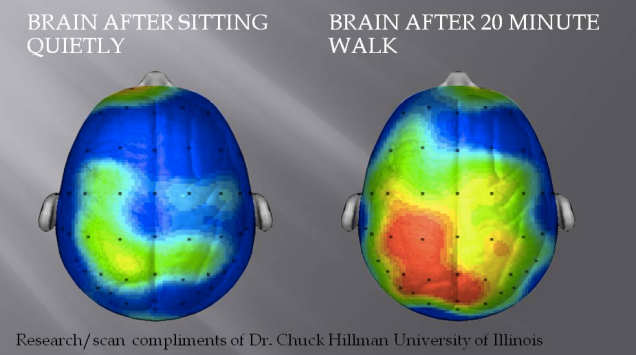Running is one of my favorite things to do. I am yet to discover an activity more exhilarating and nourishing to both the body and the imagination simultaneously.
Running takes time, though, and sometimes – plain and simple – there just isn’t time. It’s usually when my stress peaks that I find myself sacrificing my daily run and spending that time situated in front of a computer screen like a zombie.
Today, I’ll attempt to convince all of us, myself included, that sometimes it’s more important, and even more efficient, to step away from the screen and into your sneakers. The fact is, as of right now (according to a recent ADAA online poll) only around 14% of people use regular exercise as a means cope with stress.
Oh – Quick disclaimer: if running isn’t your thing, don’t worry about it. I’m not here to talk about how running can help you cope with stress, but rather about how exercise in general is an essential part of your stress management plan. After all, the important resources obtained from exercise that contribute to stress relief can be accessed through virtually any form of exercise, from weight lifting to zumba.
.Almost everyone knows that daily exercise is vital for maintaining physical health and fighting illness. Fewer people recognize that exercise is also important in sustaining mental fitness. On the other hand, one of the most villainous antagonists of cognitive functioning is a character all of us have come to know too well: stress. In the face of such dreadful adversity, let exercise be your night in shining armor.
Okay, enough of that comic-strip storyline tangent. After all, the benefits of exercise are nowhere near fictitious. In fact, they’re scientific.
When you exercise, your body begins to pump more endorphins, your body’s feel-good neurotransmitters. Ever heard of a “runner’s high?” If you’re not familiar with the term, the Scientific American defines it as, “a state of bliss achieved by athletes (not just runners) during and immediately following prolonged and intense exercise.” Endorphins are “endogenous opioids,” meaning they’re your body’s version of addictive drugs like opium and morphine. I know from experience that this release can indeed be addictive. It’s what made me and my teammates return to track practice everyday even after the most taxing workouts. At the end of that last repetition, you’re on cloud nine. Such a rush of endorphins helps eradicate the effects of cortisol, the stress hormone.
As the Mayo Clinic staff puts it, exercise is “meditation in motion.” You’ll find that once you get wrapped up in an intense tennis match or a tough Jillian Michael’s exercise tape, the stressful thoughts that have been eating away at your brain all day are easily pushed aside. Devoting your attention to your body’s physical movements and focusing on a single task (rather than, as we all like to do, repeatedly thinking over long to-do lists) is amazingly calming. Exercise also increases brain activity, allowing for a clearer, more defined though process. After exercising, you’ll be able to return to your work with better focus, motivation, and energy.
In general, physical activity improves your mood. It can bring you from “everything sucks” to “all is well” in minutes. There is evidence that regular exercise improves self-confidence and suppresses many of the symptoms linked with mild depression and anxiety. In addition, while stress might often keep you up at night, exercising can help you sleep better. With the confidence and energy to cope with stress, you should feel like you have a sense of command over your body that might otherwise be claimed by anxiety.
It’s time to add exercise to that to-do list. When you feel like you don’t have time in your schedule for physical activity, remember that it’ll help you be more productive when you return to your desk. While stress can inhibit cognitive functioning, exercise both relieves stress and promotes mental fitness! Writer’s block has got nothin’ on runner’s high.


